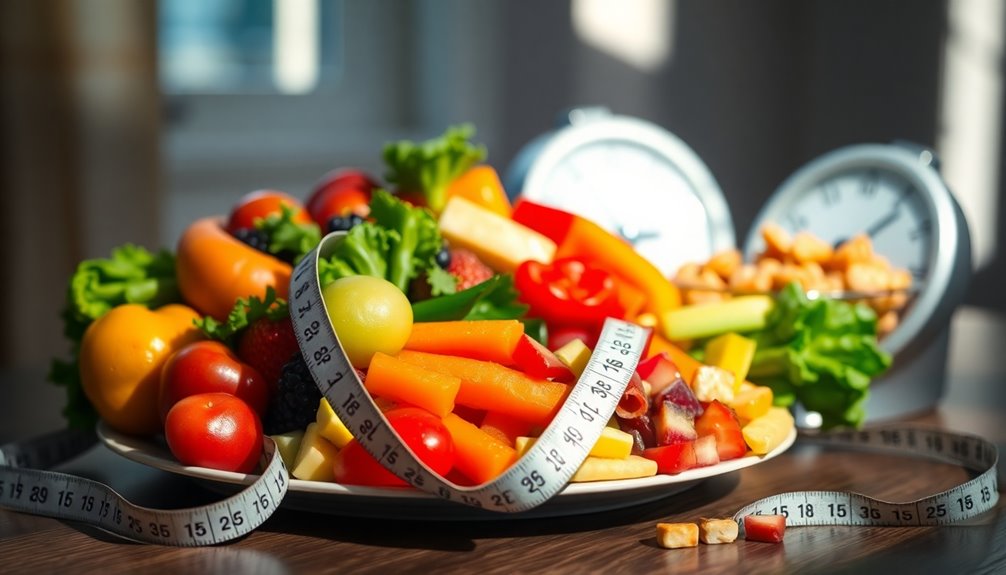You might be sabotaging your weight loss goals without realizing it. Skipping meals can mess with your metabolism, making you overly hungry and prone to overeating later. Overlooking portion sizes? That can lead to consuming more calories than you need. Liquid calories often pack hidden sugars that thwart your efforts. Ignoring nutrient balance, like incorporating enough protein and fiber, could leave you unsatisfied and craving unhealthy snacks. To end, following extreme diets may promise quick fixes but often result in yo-yo dieting. Recognizing these pitfalls is essential for your success, and there's much more to explore about sustainable eating strategies.
Key Takeaways
- Skipping meals disrupts metabolism and leads to excessive hunger, increasing the likelihood of overeating later.
- Overlooking portion sizes can result in consuming more calories than intended, hindering weight management efforts.
- Relying on liquid calories, often high in hidden sugars, can contribute significantly to weight gain.
- Ignoring nutrient balance may leave you lacking essential vitamins and minerals, affecting overall health and weight loss.
- Following extreme diets often results in yo-yo dieting, harming long-term health and making sustainable weight loss more difficult.
Skipping Meals

Skipping meals might seem like a quick way to cut calories, but it can actually hinder your weight loss efforts. When you skip meals, you disrupt your meal timing, which can affect your body's metabolism. Research shows that consistent meal timing helps regulate your hunger hormones, keeping cravings in check. Ignoring mealtime can lead to excessive hunger later, often resulting in overeating.
Additionally, skipping meals can impact your nutrient absorption. Your body needs a steady supply of nutrients to function at its best and support weight loss. If you're constantly missing meals, you mightn't get enough vitamins, minerals, and other essential nutrients, which can slow down your metabolism and sabotage your weight loss goals. It's important to remember that nourishing your body isn't just about cutting calories; it's about ensuring you're fueling it with the right nutrients at the appropriate times.
To create a more balanced approach, aim for regular meals and snacks throughout the day. This doesn't mean you have to stick to three large meals; smaller, more frequent meals can also work. By doing so, you'll help your body efficiently absorb nutrients, maintain steady energy levels, and reduce the temptation to binge later on. Incorporating breathing exercises can also enhance your metabolism and support your overall weight loss journey.
Overlooking Portion Sizes

Many people focus on what they eat but often overlook the importance of portion sizes. It's easy to assume that eating healthy foods means you can eat as much as you want. However, even nutritious foods can contribute to weight gain when portion sizes aren't controlled. Mindful eating is a powerful tool that can help you become aware of how much you're consuming.
By paying attention to your body's hunger cues, you can better gauge when you're satisfied, rather than just full.
Portion control doesn't mean depriving yourself; it's about balance and moderation. Consider using smaller plates or bowls—this simple trick can help you visually feel satisfied with less food. It's also beneficial to measure out serving sizes until you get a good feel for what appropriate portions look like.
Making a habit of checking in with your hunger levels before, during, and after meals can further enhance your mindful eating practice. You might find that you enjoy your meals more when you slow down and savor each bite, leading to greater satisfaction with smaller portions. Additionally, understanding natural calorie cycles can help you align your eating habits with your body's needs for optimal health.
Relying on Liquid Calories

Liquid calories can easily slip into your diet without you realizing it, often derailing your weight loss efforts. Many beverages, from smoothies to flavored coffees, can be packed with hidden sugars that add up quickly. You might think a drink isn't contributing to your calorie intake, but those liquid calories can be just as harmful as solid foods.
To help you visualize the impact of liquid calories, consider the following breakdown:
| Beverage Type | Average Calories | Hidden Sugars (grams) |
|---|---|---|
| Sugary Soda | 150 | 39 |
| Sweetened Coffee | 200 | 30 |
| Fruit Juice (8oz) | 110 | 24 |
| Alcoholic Drink | 200 | 14 |
| Flavored Water | 60 | 15 |
Mindful consumption is key. Pay attention to what you're drinking, and try to choose lower-calorie options when possible. Water, herbal tea, or black coffee can be invigorating alternatives that keep you hydrated without the extra calories. Remember, every small change adds up on your weight loss journey. Incorporating mini band workouts into your routine can also enhance your overall fitness and support your weight loss goals.
Being aware of the calories and hidden sugars in your beverages can empower you to make better choices. By keeping an eye on what you drink, you'll not only stay on track but also feel more connected to your health goals and community. You're not alone in this; many are maneuvering similar challenges, and together, you can achieve your weight loss aspirations.
Ignoring Nutrient Balance

Balancing your plate with the right nutrients is vital for successful weight loss. When you ignore nutrient balance, you may find it harder to achieve your goals. A well-balanced diet isn't just about cutting calories; it's about understanding macronutrient distribution—how much protein, fats, and carbohydrates you include in your meals. Each macronutrient plays a distinct role in your body, and getting the right amounts can boost your metabolism, curb cravings, and help maintain muscle mass.
Moreover, focusing on nutrient density is pivotal. This means prioritizing foods that pack a nutritional punch for fewer calories. Instead of filling your plate with empty-calorie snacks, choose whole foods that provide vitamins, minerals, and fiber. Think leafy greens, lean proteins, whole grains, and healthy fats. These foods not only nourish your body but also keep you feeling fuller for longer, making it easier to resist unhealthy options. Additionally, incorporating *effective exercise routines* can further enhance your weight loss journey.
Don't shy away from incorporating a variety of foods into your diet. Experimenting with different healthy recipes can help you find what you enjoy while ensuring you meet your nutrient needs.
Following Extreme Diets

Extreme diets often promise rapid weight loss but can lead to significant setbacks in your weight loss journey. While the allure of quick results is tempting, these extreme approaches often lack essential nutrients, which can leave you feeling fatigued and deprived. Instead of helping you, they may harm your long-term health and mental well-being.
Research shows that extreme diets can lead to yo-yo dieting, where you lose weight quickly only to regain it just as fast. This cycle can create a negative relationship with food, making it harder for you to maintain a balanced lifestyle. It's common to feel frustrated and disheartened, and these emotions can take a toll on your mental health. You deserve to feel good about your choices, not trapped in a cycle of deprivation and guilt.
Moreover, focusing solely on rapid weight loss often ignores the importance of sustainable habits. You're more likely to achieve lasting results when you embrace a balanced diet that nourishes your body. Instead of restricting yourself, consider adopting a mindful approach to eating, which emphasizes moderation and enjoyment. Additionally, consulting with a professional health care provider can help you develop a safe and effective weight loss strategy tailored to your individual needs.
Frequently Asked Questions
How Can Stress Affect My Weight Loss Efforts?
You mightn't realize it, but stress can really derail your weight loss efforts. When you're overwhelmed, your body releases cortisol, which can lead to emotional eating. Instead of reaching for healthy options, you might crave comfort foods.
Practicing effective stress management techniques, like mindfulness or exercise, can help you regain control. By addressing stress, you'll not only support your weight loss journey but also foster a healthier relationship with food.
Are There Specific Foods That Boost Metabolism?
Yes, certain foods can boost your metabolism! Incorporating metabolism boosters like green tea, chili peppers, and lean proteins can really help. These foods increase the calories you burn throughout the day.
Additionally, some dietary supplements, such as caffeine and green tea extract, may enhance this effect.
What Role Does Sleep Play in Weight Loss?
Imagine your body as a car. Just like a car needs a full tank to run efficiently, you need quality sleep to fuel your weight loss journey. Poor sleep quality can disrupt hormones that regulate hunger, making you crave unhealthy foods. Studies show that inadequate sleep can lead to weight gain. By prioritizing sleep, you're not just getting rest; you're giving your body the chance to shed pounds more effectively.
How Can I Stay Motivated During My Diet?
Staying motivated during your diet can feel challenging, but setting realistic goals is key. Break your larger objectives into smaller, achievable milestones, and celebrate each success.
Finding support from friends, family, or online communities helps too; sharing your journey fosters a sense of belonging and accountability.
Is It Okay to Indulge Occasionally While Dieting?
Research shows that 80% of people who diet experience cravings, so it's okay to indulge occasionally. Cheat days can help you enjoy your favorite foods without guilt, making your diet more sustainable.
It's all about moderation vs. deprivation; allowing yourself a treat can prevent feelings of restriction that often lead to binge eating. By fitting in occasional indulgences, you'll feel more balanced and connected to your goals, making your journey more enjoyable.
Conclusion
In your weight loss journey, it's vital to balance what you eat with how much you eat. Skipping meals might seem like a shortcut, but it often leads to overeating later. Portion sizes matter just as much as the nutrients you choose. Liquid calories can sneak in unnoticed, while extreme diets can drain your energy and motivation. By avoiding these common pitfalls, you can create a sustainable path to success. Remember, moderation and mindfulness are your best allies.



